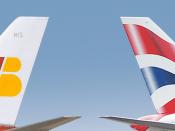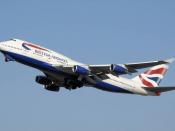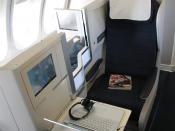In 1987, British Airways was privatised, and over the next decade turned from a loss-making nationalised company into "The World's Favourite Airline" - a market-leading and very profitable plc. The strategy that transformed the company into a marketing-led and efficient operation was conceived and implemented by Lord King as Chairman, aided by Sir Colin (subsequently Lord) Marshall: two tough businessmen who confronted staff inefficiencies and so improved service effectiveness that BA was rated international business travellers' favourite airline for several years in the 1990's.
Lord King having retired, Lord Marshall became Chairman and was succeeded as Chief Executive by Bob Ayling, a long-time BA manager.
Ayling set in train a strategy to turn BA into a "global" airline - transcending the "flag-carrier" status (the role of a nation's leading airline) it shared with Air France, Lufthansa, Swissair, Alitalia, Iberia - into an airline with no "national home" operating throughout the world.
The dropping of the overtly "British" heritage and associations was reflected in a changed brand strategy. Away went aeroplane liveries featuring the Union flag, to be replaced by tailfins bearing themed designs from around the world. This was to address the "global traveller" a savvy (mainly business) customer whose criteria for purchase were service levels, range of destinations, promptness - not price.
But the re-branding became a debacle. Customers, staff, alliance partners, shareholders and retailers (travel agents) all liked the British heritage and imagery and rebelled against the turn to an anonymous, characterless new style.
Ayling also focused on cost-reduction programmes which antagonised and demotivated BA's staff - and customers noticed the deterioration in behaviour of staff whose commitment to customer service suddenly plummeted.
The upshot was that Ayling was ousted in a boardroom coup in March 2000. During his reign, a loss of 244m in the year...



Very good.
This was actually fun to read, given the style and speed of writing. Business essays are usually dry affairs, but this made one actually feel for the team at BA.
I always felt that palava over changing the tailfins and back to the Union flag was reminiscent of the mess over New Coke. What a disaster that was....
3 out of 3 people found this comment useful.